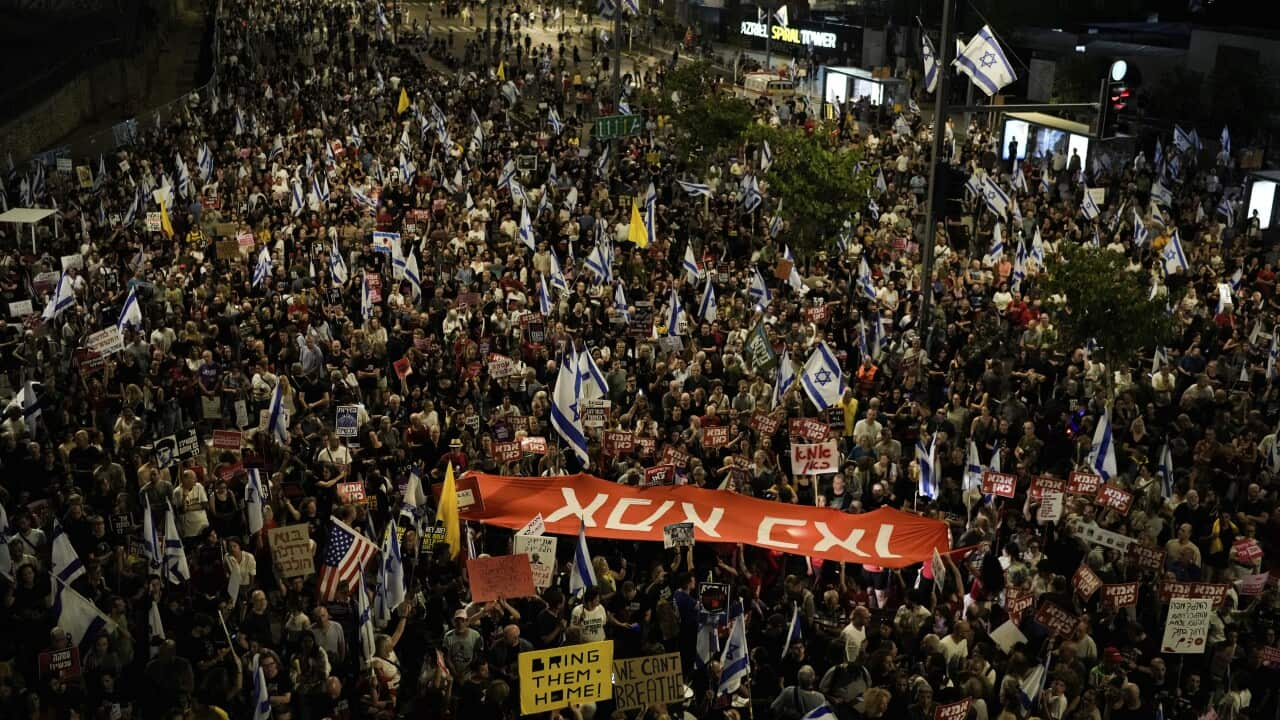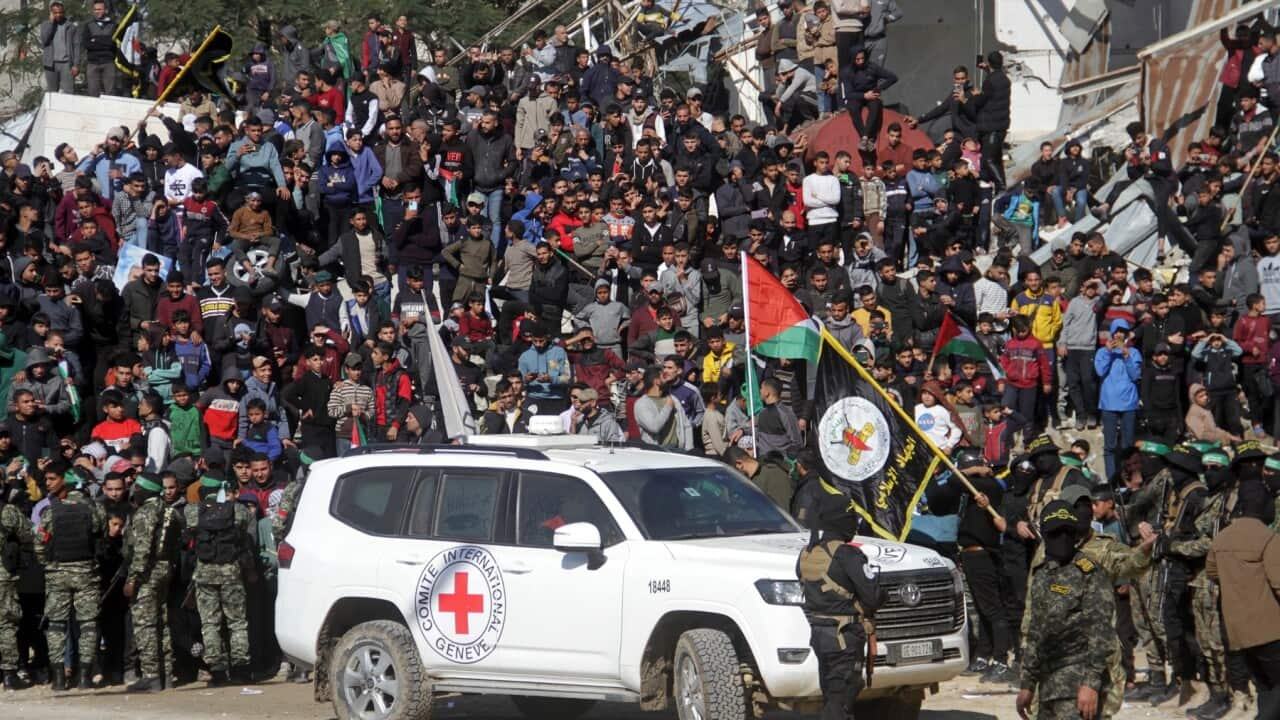TRANSCRIPT
Eight months on from the October 7 Hamas attack, only a third of the hostages abducted are believed to still be alive in Gaza.
That's about 80 of the 251 people taken.
The list of names of those who have died in captivity is growing longer - and now includes the death of four more hostages.
All of them had appeared alive in hostage videos posted by Hamas, begging for their release.
Spokesman for the Israel Defence Forces, Daniel Hagari, says intelligence gathered in recent weeks led to the confirmation of the deaths.
"Today, we shared the devastating news with the families of 85-year old Amiram Cooper, one of the founders of Kibbutz Nir Oz, 80-year old Haim Peri from Kibbutz Nir Oz, 80-year old Yoram Metzger from Kibbutz Nir Oz and 51-year old Israeli and British citizen, Nadav Popplewell, from Kibbutz Nirim, that their loved ones were killed a few months ago during Hamas captivity in Gaza and their bodies are still being held by Hamas. We assess that the four of them were killed while together in the area of Khan Younis during our operation there against Hamas..."
Jonathan Dekel-Chen says he knew the four hostages named - and he lives with constant anxiety about whether his son is still alive.
"In Israel and I think around the world, what we have witnessed since October 7th is the unleashing of hatred. We can focus on the hatred. I don't think that gets us very far. Clearly, the world around us, in Israel and beyond, seems to want to inflame those hatreds from all sides? I can think of no better answer today, in this time, at least for me, of enormous pain. Also not knowing if my son is still alive. I can think of no better answer than this kind of multi-faith gathering where we try somehow, somehow, to move beyond that pain and beyond that hatred."
Ifat Kalderon is the cousin of Ofer Kalderon, who is also being held hostage in Gaza.
She says she is losing hope that the remaining hostages will be released alive.
"I feel terrible. I feel like they are a part of my family that died today. And I feel that from week to week we hear just about more and more hostages that are dying, and now we are in a critical moment and if we’re not going to negotiate and make a hostages deal, there is no hope for this country, to Israel."
Israeli war cabinet minister Benny Gantz says he has made clear the return of hostages is a "priority on the war's timeline".
He has spoken on the phone with US Secretary of State Antony Blinken about the latest proposal for a hostage deal with Hamas.
Last week, US President Joe Biden announced a three-phase deal for winding down the Gaza war, saying the proposal had originally come from Israel.
The first six-week stage, would involve a complete ceasefire and the withdrawal of Israeli forces from all densely populated areas of Gaza.
A number of hostages would be freed in exchange for the release of hundreds of Palestinian prisoners. Humanitarian aid would also be restored, with 600 trucks being allowed into Gaza each day.
The second phase would include the release of all remaining living hostages - and Israeli forces would completely withdraw from Gaza. The third phase calls for the start of a major reconstruction of Gaza.
It is a project that could decades, with 55 per cent of all structures in the Gaza Strip destroyed, according to satellite analysis by the United Nations.
G7 leaders have urged Hamas and Israel to back the proposal.
Over the weekend, Israeli prime minister Benjamin Netanyahu posted on social media platform X, saying any ceasefire deal must also achieve the complete destruction of Hamas - or otherwise it is a "non-starter".
He is facing pressure from members within his own government, including Mr Gantz, who are threatening resignation unless Mr Netanyahu commits to a post-war plan in Gaza by June 8.
US State Department spokesman Matthew Miller says Israel should be unequivocal in backing the new ceasefire and hostage release deal.
"An endless conflict, without a political plan forward, is just going to leave Israel bogged down in Gaza, and it's going to exacerbate the security challenges that they face in the north of Israel. It's going to exacerbate the security challenges they face in the West Bank. It's going to exacerbate the security challenges they face against Iran and the proxies that it funds, because it makes it more difficult for Israel to work with its allies, and its partners, in the neighbourhood."
Meanwhile, the United Nations Palestinian refugee agency, UNWRA says the fighting in the southern Gaza city of Rafah has led to another round of forced displacement.
Around one million Palestinians - almost half of Gaza's population - have fled in what is the biggest wave of displacement since the early months of the conflict.
Many of them have taken refuge in the southern city of Khan Younis.
A burst pipeline has resulted in a a river of sewage through a main road.
Residents have resorted to using empty plastic bottles to try to remove sewage from their tents.
The UN World Food Program says the living conditions are "horrific and apocalyptic".
Describing what he saw during his recently completed three-week trip to Gaza, UN official Andrea De Domenico says the ongoing interruptions to aid deliveries are having a devastating impact.
"Something that stayed in my mind in these days was that during, when you approach, you know, the time for dinner, most probably the only meal of the day for many, the odour that you can smell all around the tents and the makeshift tents that are all around our places is very, very acrid and strong - because people burn whatever they can find. And mostly they can find, you know, basically plastic and garbage that they can use to warm up their dinner. There is no electricity, as you know. There is no cooking gas or there is very scarce cooking gas."
UN data shows the volume of deliveries of food, medicine and other aid into Gaza has dropped by two-thirds since Israel's ground operation on May 7.
Mr De Domenico says the situation cannot continue.
"This intensity of living condition is progressively eroding the social fabric of the community in Gaza. They're witnessing, the more and more, is that this fabric is progressively being destroyed. Where the rule of the strongest is becoming the only rule that is prevailing simply because, you know, there is so little for people to survive that only the strongest can have access to that. And that has eroded and penetrated even the relations within family members."
Gaza's Health Ministry says the death toll in seven months of fighting in the Gaza Strip has surpassed 36,400.
The death toll in Israel from Hamas's attacks is around 1200.













